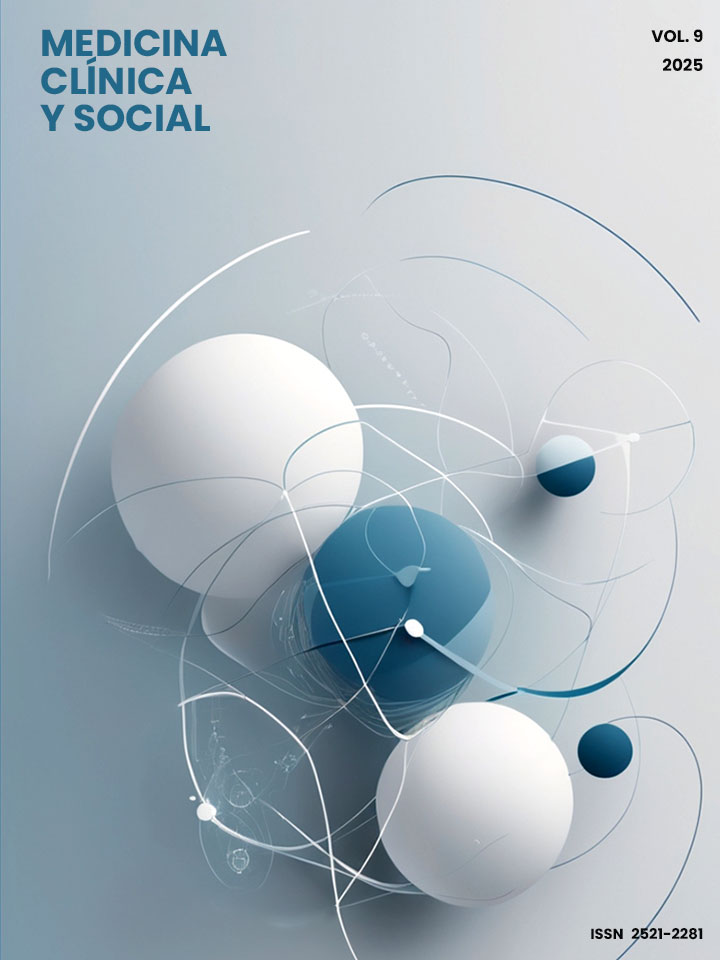Evaluation of an educational intervention on arbovirus prevention at basic school no. 1973 "Costa Alegre" in the city of Coronel Oviedo, year 2024.
DOI:
https://doi.org/10.52379/mcs.v9.645Keywords:
Arbovirosis, educational intervention, preventionAbstract
Introduction: Arbovirosis represent a major global public health concern due to their high prevalence and concentration in tropical and subtropical regions. They are mainly transmitted by Aedes aegypti and may cause clinical manifestations ranging from mild to severe. Objective: To evaluate the impact of an educational intervention on arbovirosis prevention at Costa Alegre School in Coronel Oviedo during 2024. Materials and Methodology: A longitudinal quasi-experimental study was conducted among fourth, fifth, and sixth-grade students between July and September 2024. A validated questionnaire developed by Vivas was applied, consisting of 10 knowledge questions (scored 0–1) and 6 skills questions assessed with a Likert scale. The Pan American Health Organization’s arbovirosis prevention booklet was used as educational material. Data were analyzed with Stata 16. Results: In the pretest, 27% of students demonstrated insufficient knowledge and 73% sufficient knowledge; in the post-test, sufficient knowledge increased to 99% and insufficient knowledge decreased to 1%. The McNemar test revealed a statistically significant increase in correct responses after the intervention (p < 0.001). Regarding skills, the Wilcoxon test indicated a moderate but significant improvement (p < 0.05), reflecting positive changes in preventive practices such as household cleaning, use of repellents, and control of water containers. Conclusion: The educational intervention significantly improved students’ knowledge and prevention skills, confirming its effectiveness as a school-based health promotion strategy. Replication in other educational and community settings is recommended to evaluate its long-term impact and applicability. Future studies should explore complementary strategies to strengthen learning and promote sustainable preventive practices
Downloads
References
1. WHO. Enfermedades transmitidas por vectores. 2023. https://www.who.int/es/news-room/fact-sheets/detail/vector-borne-diseases
2. Andrade-Ochoa S, Chacón-Vargas KF, Rivera-Chavira BE, Sánchez-Torres LE. Enfermedades transmitidas por vectores y cambio climático. Investig Cienc. 2017;25(72):118-28. http://www.redalyc.org/articulo.oa?id=67453654012
3. Madewell ZJ. Arboviruses and their vectors. South Med J. 2020;113(10):520–3. https://doi.org/10.14423/SMJ.0000000000001152
4. Arredondo-García J, Méndez-Herrera A, Medina-Cortina H. Arbovirus en Latinoamérica. APM. 2016;37(2):111-3. https://doi.org/10.18233/APM37No2pp111-131
5. Álvarez Escobar MC, Torres Álvarez A, Semper AI, Romeo Almanza D. Dengue, chikungunya, virus de Zika: determinantes sociales. Rev Méd Electrón. 2018;40(1):120–8. http://scielo.sld.cu/scielo.php?script=sci_abstract&pid=S1684-18242018000100013
6. Espinal MA, Andrus JK, Jauregui B, Waterman SH, Morens DM, Santos JI, et al. Emerging and reemerging Aedes-transmitted arbovirus infections in the region of the Americas: implications for health policy. Am J Public Health. 2019;109(3):387–92. https://doi.org/10.2105/AJPH.2018.304849
7. OPS/OMS. ARBO boletines. 2023. https://www.paho.org/es/arbo-portal/arbo-boletines
8. Gob.pe. Módulo educativo para la promoción de prácticas saludables frente al dengue y fiebre chikungunya. 2023. https://www.gob.pe/institucion/minsa/informes-publicaciones/320887-modulo-educativo-para-la-promocion-de-practicas-saludables-frente-al-dengue-y-fiebre-chikungunya-dirigido-al-personal-de-salud-para-el-trabajo-con-vigias-de-salud-y-miembros-del-comite-ambiental-en-instituciones-educativas
9. Vivas E, Guevara De Sequeda M. Un juego como estrategia educativa para el control de Aedes aegypti en escolares venezolanos. 2003. https://iris.paho.org/handle/10665.2/8298
10. OPS/OMS. Cartilla educativa para prevención de arbovirosis. 2020. https://www.paho.org/es/documentos/cartilla-educativa-para-prevencion-arboviroris
11. MSPBS. ¿Cuál es la situación de las arbovirosis y qué podemos hacer? 2023. https://www.mspbs.gov.py/portal/26890/iquestcual-es-la-situacion-de-las-arbovirosis-y-que-podemos-hacer.html
12. Montiel-Jarolín D, Samudio M, Torres E, Jarolín M, Taboada V, Sánchez L. Características clínicas y laboratoriales de pacientes adultos ambulatorios con chikungunya del Hospital Nacional de Itauguá, Paraguay durante la epidemia 2022–2023. Med Clín Soc. 2023;7(3):161–7. https://doi.org/10.52379/mcs.v7i3.322
13. Rojas Mosqueira M, Ríos CM. Factores asociados a la evolución a dengue grave en un hospital de tercer nivel de atención del Paraguay, 2019–2020. An Fac Cienc Méd (Asunción). 2021;54(2):79–88. https://doi.org/10.18004/anales/2021.054.02.79
14. MSPBS. Arbovirosis. 2023. https://www.mspbs.gov.py/arbovirosis.html
15. Prensa-DGVS. EGI: material actualizado para prevención y control de las enfermedades arbovirales. DGVS. 2023. https://dgvs.mspbs.gov.py/egi-material-actualizado-para-prevencion-y-control-de-las-enfermedades-arbovirales/
16. WHO. La UNESCO y la OMS instan a los países a que conviertan cada escuela en una escuela promotora de la salud. 2021. https://www.who.int/es/news/item/22-06-2021-unesco-and-who-urge-countries-to-make-every-school-a-health-promoting-school
17. Pan American Health Organization. Directrices de la OMS sobre los servicios de salud escolar. 2022. https://iris.paho.org/handle/10665.2/56726
18. Cruz-López CYS, Carlos-Sánchez M, Terrones-Santa Cruz LV, Saldaña-Jiménez MY. Conocimientos y medidas preventivas sobre arbovirosis en estudiantes universitarios de una zona endémica del Perú. Rev Inf Cient. 2022;101(4). http://scielo.sld.cu/scielo.php?script=sci_abstract&pid=S1028-99332022000400002
19. Almidón Ortiz CA, Vargas Aquije JA, Mariño Arroyo JB. Innovación educativa: aprendizaje lúdico para el control de arbovirosis. BMSA. 2021;61(4):708–16.
20. Llorente-Pérez YJ, Rodríguez-Acelas AL, Cañon-Montañez W. Intervenciones educativas para la prevención y control del dengue en adultos: una revisión integrativa. Enferm Clín. 2023;33(2):157–66. https://doi.org/10.1016/j.enfcli.2022.10.004
21. Campos Leiva YL, Perez de la Cruz JJ. Factores asociados al nivel de conocimiento en la transmisión del dengue en pobladores atendidos del centro de salud Tuman 2023 (Tesis de licenciatura). Repositorio Institucional USS; 2023. https://hdl.handle.net/20.500.12802/10843
22. Bencomo OBB, González JLL, Mesa MLC, Maya CJP, Freire EEE. Algunas reflexiones sobre investigación e intervención educativa. Rev Cubana Med Mil. 2019;48(2 Sup):316–30. https://revmedmilitar.sld.cu/index.php/mil/article/view/383
23. Alvarado-Castro V, Paredes-Solís S, Nava-Aguilera E, Morales-Pérez A, Alarcón-Morales L, Balderas-Vargas NA, et al. Assessing the effects of interventions for Aedes aegypti control: systematic review and meta-analysis of cluster randomised controlled trials. BMC Public Health. 2017;17(1):384. https://doi.org/10.1186/s12889-017-4290-z
Downloads
Published
Issue
Section
License
Copyright (c) 2025 Patricia Ríos Mujica, Catalina Elizabeth Segovia Barboza, Estigarribia G., Julieta Méndez, Guiomar Viveros de Cabello, Gloria González, Deisy Galeano

This work is licensed under a Creative Commons Attribution 4.0 International License.






